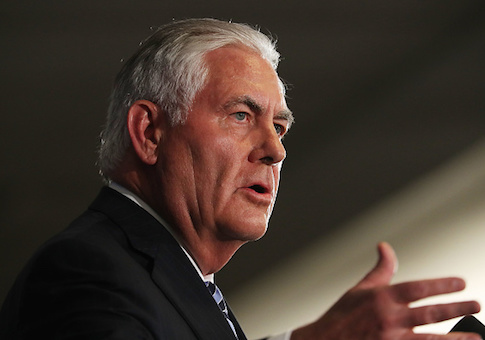Secretary of State Rex Tillerson plans to meet with Cuba's top diplomat Tuesday evening in Washington just days after U.S. officials expressed an "urgent need" to unravel the mystery of the "sonic" attacks on U.S. diplomats in Havana.
Tillerson's public schedule for Tuesday shows a meeting with Cuban Foreign Minister Bruno Eduardo Rodriguez Parrilla at 5 p.m. at the State Department.
A State Department spokesman declined to provide immediate further comment on the context of the meeting, which comes amid heightened tensions between the United States and Cuba over bizarre "acoustic" or "sonic" attacks on U.S. diplomats stationed in Havana.
Tillerson said last week he was considering closing the U.S. embassy in Cuba and expelling Cuban diplomats from the United States over the attacks after five GOP senators on the Intelligence Committee, including Chairman Richard Burr (R., N.C.), called for the drastic action.
Shuttering embassies in Cuba and the United States would likely reverse much of the effort to normalize relations with Cuba that the Obama administration tried to implement.
The senators and those in the American diplomatic corps are growing increasingly frustrated by the dearth of information about what is causing the attacks and how they occurred against U.S. diplomats while they slept in their residences in Havana.
Cuban officials have said they are cooperating as fully as they can and have allowed the FBI unprecedented access to investigate the attacks, officials have said.
Key lawmakers and sources familiar with the Castro regime's practices argue that the Cuban government's surveillance of U.S. personnel is so close that it is highly unlikely that its officials did not know about the attacks or were not complicit in some way.
The Washington Free Beacon first reported that the U.S. was hiding key details about the attacks—that the number of diplomats attacked was much higher than the single-digits State Department officials had publicly confirmed in early August and had occurred months earlier than they had stated.
CNN over the weekend reported that 21 of the diplomats who experienced the attacks were targeted as many as 50 times total.
The attacks, according to several knowledgeable sources, have left some victims experiencing permanent hearing loss, damage to their cognitive abilities, sleeplessness, and other serious symptoms.
As frustration in the United States continued to mount last week, the United States and Cuba went forward with their first formal diplomatic meeting since President Trump was elected. Afterward, the United States reiterated its deep concern for the safety and security of the U.S. Embassy community in Havana and stressed the "urgent need to identify the cause of these incidents and to ensure they cease."
Cuban officials were not as diplomatic in their assessment of the current state of U.S.-Cuban relations. After the meeting, the Cuban delegation protested Trump's "disrespectful, unacceptable, and meddling statements" during his address to the United Nations General Assembly.
Cuba also noted that the commission meeting took place against the backdrop of what they considered a "reversal" in the diplomatic and economic thaw pursued during the final years of the Obama administration.
Trump announced restrictions on Americans traveling to the island and prohibited U.S. visitors from staying in any hotels doing business with the Cuban military in June.
Trump, during his U.N. remarks, denounced the "destabilizing regime in Cuba" and called on "the nations of the world to take a greater role in promoting secure and prosperous societies in their own region."
"That is why the United States has stood against the corrupt, destabilizing regime in Cuba and embraced the enduring dream of the Cuban people to live in freedom," he said.
Trump also reiterated his administration's intent not to lift sanctions on the Cuban government until it makes "fundamental reforms" and touted recent sanctions on the Maduro regime in Venezuela, Cuba's closest ally.
